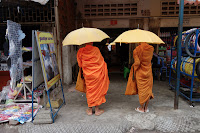It is obvious the world is in trouble. What is not so obvious is how we can get out of it. For thousands of year, across continents and civilizations, people see the suffering, the hatred, the fighting, and finally the inevitable death. Part of the problem is the capricious nature. The greater problem, however, is how we treat each other. The two places that we are taking our students this summer are Cambodia and Rwanda. Both countries have suffered from horrendous genocide in their recent past. People are trying to help. But there is only so much that we can do.
The sages of Chinese Taoism noted wisely that following the ways of natural will remove a lot of obstacles and make life much smoother. That works to some extent. But what if nature is naturally capricious to start with? Sickness, competition, looking-after-yourself-first, and death are all part of nature. How can we escape by following the ways of natural?
 The buddha tells us that suffering will cease when we are enlightened and achieve nirvana. Indeed, much that we feel are actually happening in our minds and do not necessarily reflect reality, as neural science is telling us. The suffering around us, however, are so overwhelming, physical, incessant and real. I doubt very much that our minds, even when enlightened, are strong enough to deliver us from such evil.
The buddha tells us that suffering will cease when we are enlightened and achieve nirvana. Indeed, much that we feel are actually happening in our minds and do not necessarily reflect reality, as neural science is telling us. The suffering around us, however, are so overwhelming, physical, incessant and real. I doubt very much that our minds, even when enlightened, are strong enough to deliver us from such evil.  In the end, I am convinced that evil and suffering are real and physical. And it takes a tremendous sacrifice - in the form of the suffering and death of Jesus the Son of God - to free us from it. Today we commemorate His act of salvation for us - hence it is truly a “Good” Friday.
In the end, I am convinced that evil and suffering are real and physical. And it takes a tremendous sacrifice - in the form of the suffering and death of Jesus the Son of God - to free us from it. Today we commemorate His act of salvation for us - hence it is truly a “Good” Friday. 
.jpg)
.jpg)

.jpg)








.jpg)
.jpg)
.jpg)
.jpg)
.jpg)
.jpg)




